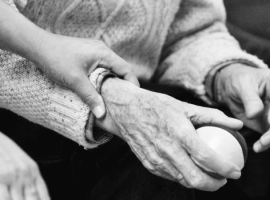Assisted living: A caregiver’s dilemma and guilt
In this blog post, Geeta Iyer talks about the difficult decision of looking into dementia care facilities and also about the guilt that caregivers go through when making the tough decision of whether to leave their loved ones at an assisted facility or not.

Over two years ago, it became clear to us that my dad needed 24-hour care and couldn’t be left alone. This was when he started exhibiting many symptoms of dementia, including not knowing where he was or who we were. I instantly became this overprotective daughter, who wanted to make sure he never got lost or fell or wet himself. I remember being peeved when my dad wandered up a flight of stairs to his bedroom while in my mom’s care. She had just stepped into the kitchen for a moment, but I thought she was negligent.
“If he falls, he falls. We are doing all we can,” she said. And, we were. Eventually, it took quitting my job, selling my house, moving to India, and hiring full-time help at home to keep up with the progression of this awful disease.
Would I ever put him in a dementia care facility, assuming it was available here? Probably not, but it is a topic that has crossed my mind more than once.
When hired caregivers go on vacation!
June 11, 2019: Leela, our daytime caregiver for dad had a family emergency and called the day off. Luckily, I hadn’t planned anything for the day and could easily step in. I toyed with the idea of getting a replacement but dropped the idea as it was so last minute.
Dad has been in ‘La La Land’ a bit more than usual these past couple of days, so getting him to have a bath was not a smooth event. He is physically getting weaker, so it is actually amazing that he goes through the routine every single day. As he often does, he had changed his mind (or forgotten) about bathing soon after agreeing to it. Pretty soon, he was raising his hands, getting abusive, and predictably, I joined his chorus. We were having our totally dysfunctional moment together. I was the adult here, and knew he had no control over what was registering in his brain or his responses. It was over soon, I was calm again and he was his old trusting, affectionate self. And I was left with my guilt of having failed. Again!
The month of May passed in a state of despair and dysfunction to say the least. In the prior months, I had gotten used to outsourcing the tiresome aspects of my dad’s care at home. Though my mom and I were constantly present in the background and rarely left home for more than a couple of hours, we had the option to retreat into our personal space.
That perfect routine was disturbed when both the daytime and nighttime caregivers took turns to go on vacation, each for more than a week. As is pretty common in India, they did not return when they said they would. So, by the end of the month, I was at my wits’ end, becoming sleep deprived and cranky. It stressed me out thinking about finding temporary replacements, as I would have to train them. So, I ended up carrying the load. I realized that I am no longer willing to take care of my dad by myself without help, even for a few days. Hired help had become essential for my sanity and survival.
Guilt
An Indian friend of mine in the US had to place her mother-in-law, who had dementia combined with Parkinson’s, at a memory-care facility. This was after years of coping with hired help at home and juggling her career, marriage, and kids all at once. Her conversation about it was laden with both guilt and helplessness.
Another friend of mine had quit his job for over a year to take care of his mom, who had dementia. She had some of its most challenging symptoms, was delusional and prone to wandering. Totally sleep deprived and realizing the limits of the care he could provide at home, he started looking for an appropriate facility for his mom. However, it wasn’t a simple matter to be executed over a weekend.
I think most people do this as the last resort, even if they can financially afford it. I come from a culture where a joint family system was the norm just a couple of generations ago. Hence, there is a lot more judgment associated with such decisions.
An agonizing decision
No matter where you are, there are so many factors that drive this difficult decision. Affordability, proximity, cultural compatibility (food, language, other), severity of dementia, and the extent of care required would be some of these.
No caregiver makes this decision lightly, so mostly we want to be assured that our LO (Loved One) will not be neglected or abused in any way. We are often at a loss to figure out activities for distraction, redirection, and preventing cognitive decline. It is my understanding that many memory-care type facilities are designed for dementia patients. I haven’t seen one firsthand yet but have watched videos online and have also read about them.

As I write this, I realize that I feel a bit defensive about placing our loved one (my dad) in a facility. I think we are deeply conditioned to equate such a decision with abandonment.
I spend quite a bit of time everyday reading social media posts of caregivers across the globe. The topic of placing a family member with dementia in some type of assisted living facility as well as choosing the right one comes up often. It is an agonizing decision, no matter where you are. There are deep emotional connections involved, and there is a certain sense of abandonment of the LO and guilt on the part of the caregiver when someone has to be moved out of their ‘home’.
The reality is that, the home may be an unsuitable and unsafe environment for someone who has dementia. Most of us are ill equipped to handle the challenges that dementia throws at us and are usually juggling multiple priorities at home. We lose it on a daily basis and after living a life of constant sacrifice and sleepless nights, feel like the worst human being on the planet.
As with most things, there is no one size fits all solution to this. The right and wrong are not absolutes here, and are to be based on the family, financial and emotional circumstances each LO and caregiver faces.
What are your thoughts on this topic? I would love to hear your comments and experiences. So, go ahead and comment away. I promise that I’ll respond.
Related links:
https://caregiver.com/articles/managing_caregiver_guilt/
https://www.aarp.org/caregiving/life-balance/info-2017/living-with-guilt-bjj.html
Caregiver guilt is a true emotion; it’s been validated too: https://www.researchgate.net/publication/41507373_Development_and_validation_of_the_Caregiver_Guilt_Questionnaire
https://www.ncbi.nlm.nih.gov/pubmed/30793838



There are no comments